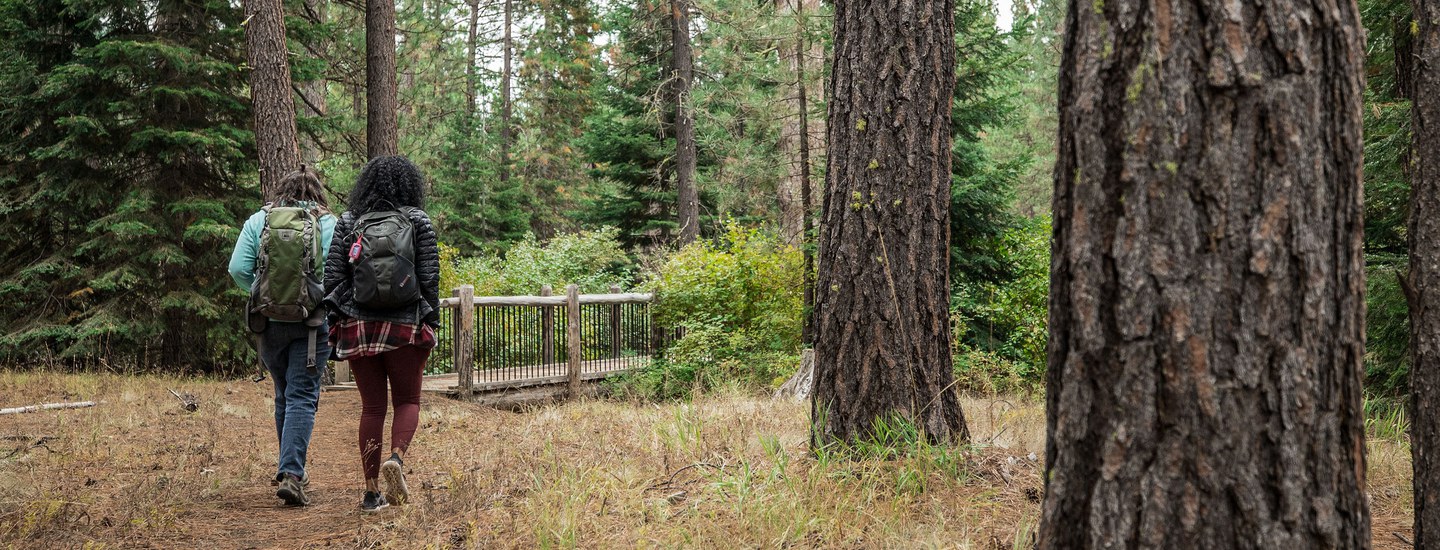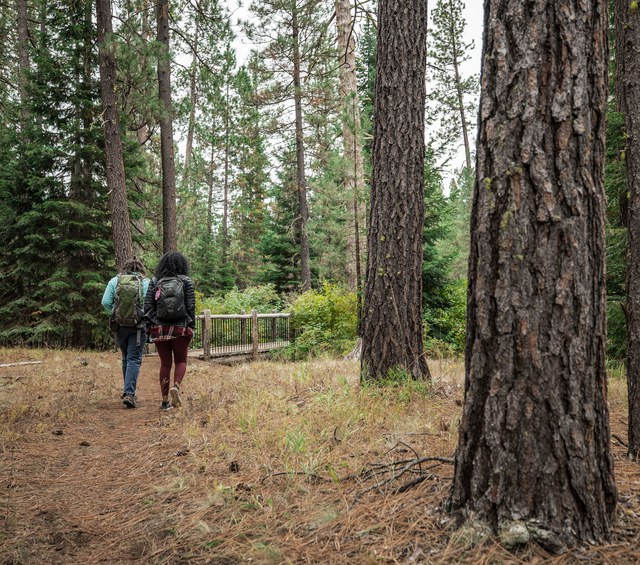For so many the outdoors is a special place. It can be a place to reconnect with nature, a chance to get away from it all, a moment to feel alive, to breathe deeply, to challenge oneself, to find community, to find thrill, to find inspiration, or to find peace.
The outdoors isn’t this way for all. The long histories of colonization, racism, sexism, ableism and elitism on which our country was founded continue to impact our outdoor spaces today; and the conservation and recreation sectors are not immune.
As we work towards building a more welcoming and inclusive outdoors for everyone in Central Oregon, it’s important to first reflect on some of the many ways we experience the outdoors differently. Here are five reflections on how experiences in the outdoors are different for many people:
1. Choosing the ‘outdoors’
In her blog post for the Outdoor Women’s Alliance Lynn Lieu describes her relationship with the outdoors as one of luxury. She is reminded that before the outdoors can be for everyone, families need their essential needs met. She reflected that “my parents worked hard to give me the privilege of ‘indoors.’ They came to the United States in the ’70s from a war-torn Vietnam where plumbing was a luxury and living outdoors wasn’t a choice—it was often the only option.” Lieu recognized that later as an adult she had the privilege to choose the outdoors. She says, “everything my parents provided for me indoors gave me the ability to appreciate everything outdoors. While luxury for my mom was air conditioning and modern technology, luxury for me was not having to worry about any of those things and being able to go outside—for fun.” When we think of creating an outdoors for all, we have to remember that going outdoors is not a choice for everyone, nor is it always for fun.
2. Understanding the ‘outdoors’
Rock climbing, mountaineering, kayaking, and hiking are activities often associated with the outdoors; but in a recent article Central Oregon outdoor advocate Zavier Borja reflected that seeing the outdoors through this narrow view is limiting. The dominant narrative paints the outdoors as pristine, isolated, remote, and beautiful places. And, while being outdoors can be those things, this limited outlook ignores a multitude of other ways of being and understanding the outdoors. Zavier shared that “I think this outdoor narrative... is very confined, specific, and limiting.” Not only does this limited view exclude people that enjoy other outdoor activities like walking about their neighborhood, but it also excludes people by discrediting other traditions and ways of interacting with the outdoors. Creating an outdoors for all must start with creating a wider definition of the outdoors, and the many ways we can understand it and interact with it.
3. Paying for the ‘outdoors’
There are parking passes and wilderness permits, but a great barrier to the outdoors is that it has many costs, and many of them remain hidden. What might first come to mind is the cost of outdoor gear, ski passes, or enrolling in classes to learn new skills. Undoubtedly, those costs are barriers to many. But even at the most basic level, interacting with the outdoors assumes folks have leisure time available to take a break from working to maintain a living or caring for others. In our society time is money, and people’s daily necessities come far before investments in enjoying the outdoors. Read this blog to dive deeper into some barriers that exist in our outdoor spaces.
4. Staying safe in the ‘outdoors’
Safety is important no matter how you’re interacting with the outdoors. For some folks staying safe in the outdoors means making extra considerations and requires extra effort. For folks who haven’t grown up or been raised in a community of people enjoying outdoor activities, outdoor skills and safety practices have to be sought out and learned. Beyond the danger of injury, though remain all the dangers faced daily by marginalized groups of people. The discrimination that exists throughout our society continues on our trails and in our outdoor spaces. Because these spaces are often remote and involve isolation, the real dangers of discrimination in the outdoors are amplified. Wherever unsafe feelings toward interacting with the outdoors are rooted, we cannot ask folks to enter into the outdoors or declare it as a space for all without recognizing and working to resolve the causes of outdoor fear. Read this opinion piece ‘On being alone as a woman in the woods.’
5. Belonging in the ‘outdoors’
As if actually getting to an outdoor space isn’t barrier filled enough, once folks are there it isn’t always comfortable. From sideways glances, rude comments, unwritten rules (like in Danielle William’s blog), feeling like you don’t fit in, or wondering if folks will make fun of your old hand-me-down gear, discomfort in the outdoors can run the gamut. A narrow view of the outdoors has created a narrow understanding of who and how people should behave when they are outdoors. Many of us see familiar and smiling faces on our favorite walks, can read the language all signs are printed in, and have bodies able to navigate a variety of trail systems. But many others do not share that experience of ease and comfort. Creating places where people from all backgrounds can find a sense of belonging isn’t just an important first step in creating an outdoors for all, but is also an important step in creating a community that is connected to and cares deeply enough about their outdoors that they want to save and protect it.
We can take strides toward creating an outdoors that is more welcoming for all when we thoughtfully consider the reality that many folks do not share our positive experiences when engaging with the outdoors. Remembering that not all experiences are like our own, gives us all the chance to have more empathetic trail encounters and provide the space for others to explore and connect with the outdoors. Creating an outdoors that is more welcoming for all is a great opportunity to build and encourage folks from all backgrounds to come together to love and care for this planet--something we need more of every day.
Join us for a virtual panel Thursday, September 24th with local outdoor leaders to discuss how the Central Oregon outdoors can truly become a space for everyone. Register here.
Learn more:
- Check out this blog by Warm Springs tribal member, Carina Miller on the privilege of the outdoors
- Dig deeper into the exclusive history of conservation in this article
- Read the Land Trust’s commitment to Equity in the Outdoors


